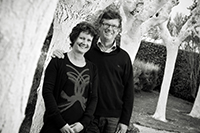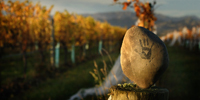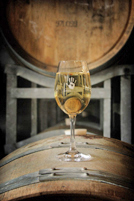|
Search
|
Most Popular
Organic Wine Producers in New Zealand
 When James and Annie Millton started farming their Gisborne vineyard according to organic principles, in the 1980s, no one else was doing it in New Zealand. Conventional wisdom was that grapes had to be raised on cocktails of synthetic fertilisers, and sprayed with toxic chemicals to keep away nasty grape diseases and insect pests.
When James and Annie Millton started farming their Gisborne vineyard according to organic principles, in the 1980s, no one else was doing it in New Zealand. Conventional wisdom was that grapes had to be raised on cocktails of synthetic fertilisers, and sprayed with toxic chemicals to keep away nasty grape diseases and insect pests.
In celebration of 25 years of successful organic growing, the Milltons, New Zealand’s first certified organic grape-growers, recently released a new line of wines they call Crazy by Nature.
Says James Millton: “In 1984 they thought we were crazy. We’ve just spent the last 28 years proving to everyone that they were right. We are crazy. But now it seems everyone wants to be crazy too, and it’s just what this planet needs.”
Indeed, many more New Zealand grape growers want to be “crazy” these days. James Millton now chairs Organic Winegrowers New Zealand (OWNZ), a growers’ organisation with over 140 members who are either organic or leaning that way. In the last three years, the total land area of New Zealand’s organic vineyards has tripled – from about 600 hectares in 2008 to nearly 1800 hectares in 2011. If OWNZ has its way, that number will keep on growing. The group aims to see at least 20% of New Zealand grapevines under organic management by 2020. New Zealand Winegrowers, the national industry body for grape and wine producers, supports that goal as well.
 It’s not just a quest for a green image that is driving the push toward organics in the vines. Many winemakers are enthusiastic about the quality of organic fruit. In an industry where quality counts, growers are keen to produce the finest grapes they can. Many believe that organic practices enable them to fully express their vineyard’s terroir – that enigmatic flavour of the land which speaks of the soil, weather, and natural elements; the unique spirit of each place that winemakers passionately hope to express in a finely crafted sip.
It’s not just a quest for a green image that is driving the push toward organics in the vines. Many winemakers are enthusiastic about the quality of organic fruit. In an industry where quality counts, growers are keen to produce the finest grapes they can. Many believe that organic practices enable them to fully express their vineyard’s terroir – that enigmatic flavour of the land which speaks of the soil, weather, and natural elements; the unique spirit of each place that winemakers passionately hope to express in a finely crafted sip.As compared to other organic industries in New Zealand, the organic wine movement is marked by the particularly strong emphasis that many winegrowers place on the practice of biodynamics to encourage the expression of terroir. Biodynamic growers focus on seeing the farm as a single integrated organism. That means enhancing biodiversity, cycling materials within the property, and incorporating the use of animals.
“When the farm is considered and treated as a living organism, it begins to express its own unique individuality,” says Colin Ross, estate manager at biodynamic wine producer Seresin Estate. That individuality, biodynamic growers believe, shows up in each glass of wine. Seresin enhance connections within their vineyard landscape by composting with materials from their own land, using manure from their own animals, and even cultivating a vege garden and chickens, sheep, and cattle to provide food for staff. A well-loved “house cow,” Olga, grazes and ruminates between the vines. “A farm should be considered as the sum of the landscape, water, plants, animals and people,” Colin says. “All of these elements need to be in harmony. The more connectivity that exists between the parts, then more of the farm individuality can be expressed.” As a sizable commercial producer with over 112 hectares of vines, Seresin recently gained local notoriety when the vineyard went “back to the future” by acquiring two Clydesdale horses to pull its spray rig through the vine rows.
 Following the teachings of spiritual scientist Rudolf Steiner, biodynamic growers also seek to work with subtle cosmic influences of the universe. Cycles of the moon, constellations and planets are considered in the timing of vineyard operations. Specialised preparations from manure, minerals, and plant matter are sprayed on the vineyard at particular times and incorporated in compost.
Following the teachings of spiritual scientist Rudolf Steiner, biodynamic growers also seek to work with subtle cosmic influences of the universe. Cycles of the moon, constellations and planets are considered in the timing of vineyard operations. Specialised preparations from manure, minerals, and plant matter are sprayed on the vineyard at particular times and incorporated in compost.Practical results from organic vineyard trials are also proving convincing. A network of “organic focus vineyards” around the country is currently comparing side by side organic and conventionally managed vineyards to see how the two stack up. The three-year trial is being run by Organic Winegrowers New Zealand, with funding from the Sustainable Farming Fund and New Zealand Winegrowers. In the first year of a pilot trial at Mission Estate Winery in Hawkes Bay, vineyard managers found that despite challenging wet weather events in the 2010-11 growing season, the organic vineyard experienced no increase in pest and disease problems, & no loss in harvests – & it cost slightly less than a conventional vineyard to run it.
I’ll drink to that.
New Zealand fully certified organic vineyards
Auckland region: Turanga Creek
Bay of Plenty: Covell Estate
Gisborne: Millton Winery, Wrights Wines, Tiritiri Estate
Hawkes Bay: Two Gates
Wairarapa: Vynfields, Urlar
Marlborough: Seresin Estate, Hans Herzog Estate, Serpentine, Rock Ferry*, The Darling*, Fromm*, Huia*, Churton*
Nelson: Richmond Plains, Sunset Valley Vineyard, Woollaston Estates
Canterbury: Muddy Water, Fancrest Estate, Takamatua Valley Vineyards
Central Otago: Felton Road, Kawarau Estate, Carrick Wines
*Indicates wineries which produce some wine from fully certified organic grapes, and produce other wines from grapes that are in transition to organic production.
Certified biodynamic vineyards include Millton, Seresin, Felton Road, Richmond Plains, and Vynfields.
All certified vineyards are independently audited each year by an accredited certification agency.
Many more vineyards are currently in the process of gaining organic certification. Many large wineries, including Villa Maria, Pernod Ricard NZ, Grove Mill, Vidal, Allan Scott, Mahi, and Babich, now make a few organically grown wines as well.

